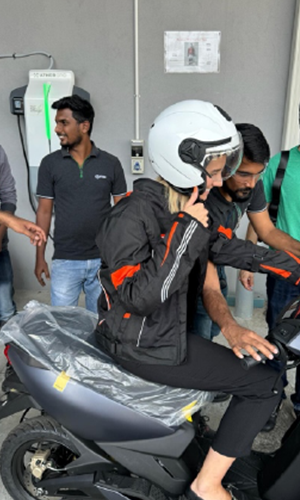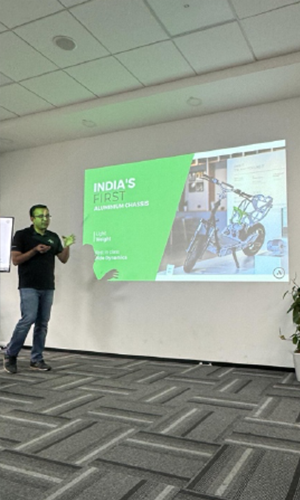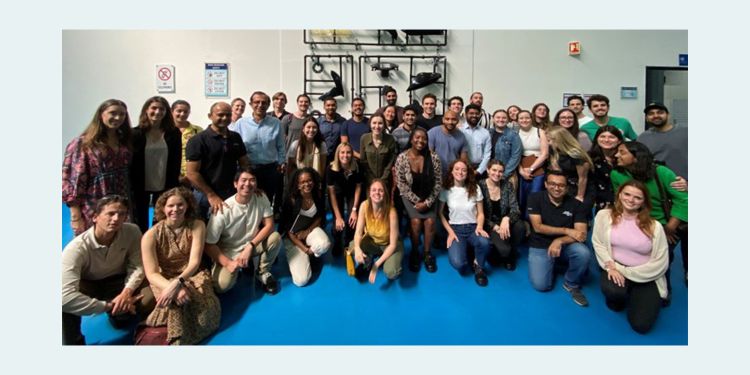Professor Vikram Gandhi’s Immersive Field Course (IFC) “Development while Decarbonizing: India’s Path to Net-Zero" delved into the critical aspect of decarbonization and sustainability goals amid India's rapid development. The course presented an opportunity for students to advance their knowledge of sustainability efforts, decarbonization, and net zero in the context of a broader development agenda. The class culminated in a series of site visits in January 2024 in Mumbai and Bangalore and this is one of 14 student essays that highlights their reflections on uncovering sustainable solutions across the country.
Transportation stands as one of the leading contributors to global emissions, trailing only behind the power and industrial sectors. Consequently, the widespread adoption of electric vehicles (EVs) for personal transportation is integral to achieving India’s net-zero goals. With a current count of 280 million 2-wheelers in India – a number projected to rise to 400 million in the next decade –, this category is responsible for the highest automotive emissions in the country. To achieve decarbonization in India, a strategic focus by public and private stakeholders must be placed on the decarbonization of 2-wheeler mobility. Nevertheless, certain impediments to widespread adoption persist, including inadequate charging infrastructure, customer apprehension, and a shortage of domestic battery manufacturing capacity. Our site visits to Ather Energy and Log9 provided insight into India’s efforts to electrify 2-wheelers and advancements in battery technology.
Ather Energy Visit
Ather Energy, headquartered in Karnataka, India, is an electric two-wheeler manufacturer founded by Tarun Mehta and Swapnil Jain in 2013. Originally aspiring to develop superior batteries, the company evolved into India's first smart electric scooter. Operating manufacturing facilities in Whitfield, Bangalore, and Hosur, Tamil Nadu, Ather Energy has established Ather Grid, India’s largest two-wheeler electric charging network.
Our visit to Ather Energy's second plant in Bangalore showcased its expanded production capacity of over 400,000 units. With 1,600 employees, the facility hosts two vehicle lines and three battery lines. Ather's success in the market, amid customer uncertainty, can be attributed to their focus on creating desirable products rather than merely complying with regulations (as ICE 2-wheelers are scheduled to be banned). Their approach involves building exciting EVs through locally conducted R&D that people aspire to buy, with the environmental benefits serving as post-purchase rationalization. The range of their vehicles (120-160km) is not perceived as a concern, given the typical usage patterns of 2- wheelers for short distances. Although most users charge their vehicles at home, the Ather Grid's fast charging network proves valuable in emergencies. The network, with 1,800 charging stations, is becoming the national standard.

We were lucky enough to see both their production lines for how they manufactured their batteries and their vehicles. It was incredible to see the standards they set for the workers and the training and investment into labor – workers undergo a two-week intense manufacturing training in a designated "dojo," complemented by automation on the production line to enhance efficiency.
Evident in the sleek and compact design of their vehicles, quality is a paramount focus in Ather Energy's manufacturing process. The vehicles embody the brand's vision — aspirational and premium. As established players transition from internal combustion engines (ICE) to electric vehicles, it will be intriguing to observe Ather Energy's progress and how they respond to evolving market dynamics.

Log9 Visit
Headquartered in Bangalore, Log9 Materials, an EV battery technology startup, inaugurated India's first commercial lithium-ion cell manufacturing facility. Founded by Akshay Singhal and Kartik Hajela in 2015, the company focuses on creating EV batteries tailored for efficient operation in Indian and tropical climates.
We discovered that Log9 firmly believes material science is the key differentiator in India's EV battery development. Their breakthrough occurred in 2019 with the RapidX series, touted as the fastestcharging EV battery (less than 15 minutes for 2-wheelers and 35-40 minutes for 3- to 4-wheelers), known for its durability in challenging tropical conditions.
In conversations with management, it became evident that Log9's target customer is the commercial mobility sector. They find it easier to educate commercial clients about the benefits and technical differentiators of their EV batteries. Additionally, commercial customers’ more pronounced push for EV requirements and a shorter payback cycle help expedite Log9's adoption and product expansion. Additionally, large domestic incumbents producing competitive batteries focus on the personal mobility sector, leaving room for Log9 to differentiate through superior customer service in the commercial sector. While most incumbents rely on international research, Log9's robust internal R&D team enables them to maintain defensible intellectual property aligned with the swift changes in cell technology.
Our visit included insights into Log9's research labs, where engineers shared details about their groundbreaking work with graphene, leading to the development of their ultra-fast charging battery technology. Witnessing a deep-tech company passionately addressing a challenging and relevant problem was inspiring and infectious.
We are extremely thankful to Ather, Log9, Harvard GEO and Professor Vikram Gandhi for organizing and hosting us. It was incredible to hear about the efforts undertaken by the deep tech community in Bangalore and they are vital to providing the innovation and future products that will decarbonize the personal mobility sector in a large and complex country such as India. We will be following these companies’ progress in the future!

